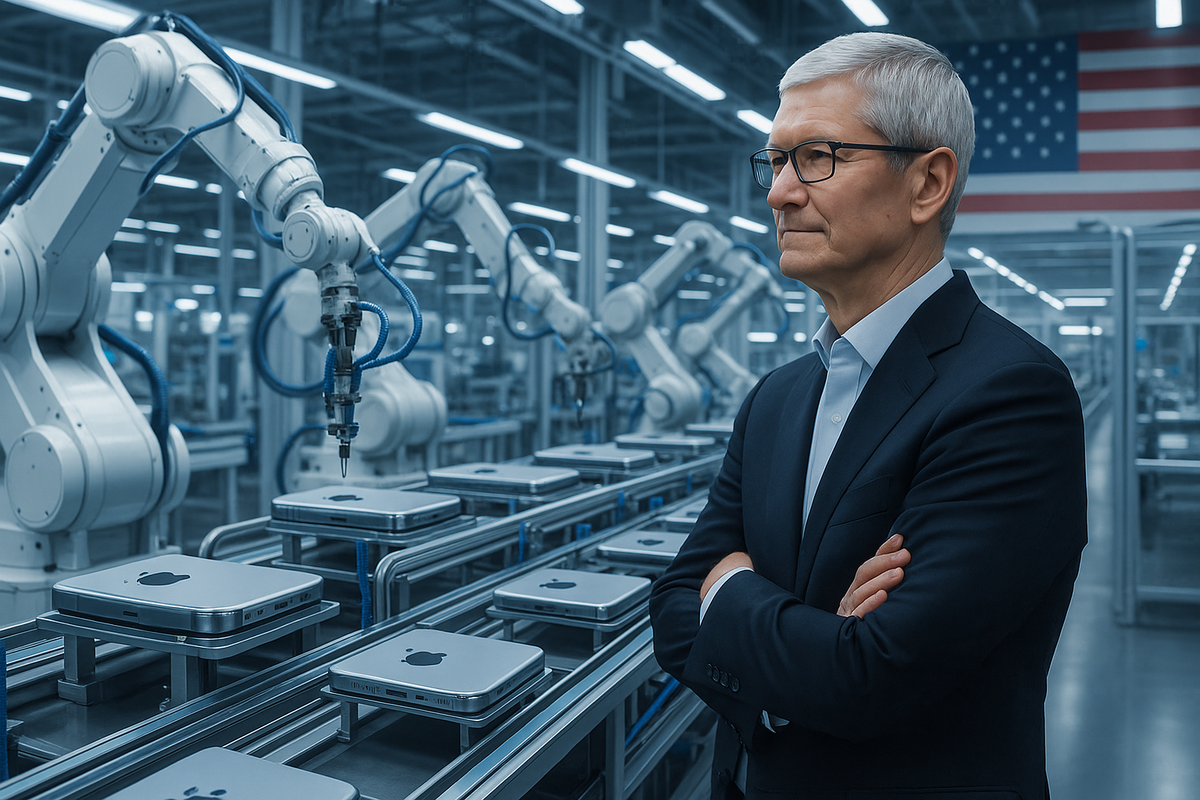Financial News
Apple's $100 Billion US Investment Ignites Stock, Reshapes Manufacturing Landscape

Apple's (NASDAQ: AAPL) stock experienced a significant surge following CEO Tim Cook's announcement of an additional $100 billion investment in US manufacturing over the next four years. This strategic move, revealed on August 6, 2025, during an event with then-President Donald Trump, brings Apple's total planned US investment to an astounding $600 billion over the same period, building upon a previous $500 billion pledge. The news sent a clear signal to investors and the market, highlighting Apple's commitment to domestic production and its proactive approach to navigating evolving geopolitical and economic landscapes.
The immediate implication of this announcement was a substantial boost to Apple's market valuation, with shares climbing over 5% and adding approximately $140 billion in market value in a single day. This investment is poised to reshape the US manufacturing sector, create thousands of jobs, and potentially set a precedent for other multinational corporations facing similar pressures to localize their supply chains.
A Monumental Commitment: What Happened and Why It Matters
On August 6, 2025, Apple CEO Tim Cook publicly committed an additional $100 billion towards US manufacturing initiatives over the next four years. This announcement was made during a high-profile event at the White House, underscoring the political significance of the investment. This new pledge supplements an earlier $500 billion commitment, bringing Apple's total planned US investment to an unprecedented $600 billion. The timeline leading up to this moment has been characterized by increasing pressure from the US government for domestic job creation and manufacturing, particularly under the "America First" economic agenda.
The key players involved are, of course, Apple (NASDAQ: AAPL) and its leadership, particularly Tim Cook, alongside the US government, represented by the then-President. This move is a direct response to the administration's push for increased domestic production and its threats of tariffs on imported goods, especially critical components like chips. By making such a substantial investment, Apple effectively secured an exemption from these potential tariffs, a strategic maneuver to protect its vast supply chain and mitigate significant financial risks.
Initial market reactions were overwhelmingly positive. Apple's stock surged over 5% on the day of the announcement, closing up 5.1% at $213.28 per share, and saw a further increase of 2.82% in after-hours trading. This surge added approximately $140 billion to Apple's market value in a single day, reflecting strong investor confidence. The positive sentiment extended to the broader tech sector, with the Nasdaq Composite leading gains, settling 1.21% higher. Analysts from firms like UBS noted that a "major uncertainty has been removed," providing renewed clarity and conviction among investors regarding Apple's future trajectory.
The Shifting Sands: Winners and Losers in the Wake of Apple's Investment
Apple's colossal $100 billion investment in US manufacturing is set to create a distinct set of winners and losers across various industries and geographies. The most immediate beneficiaries are likely to be US-based manufacturing companies and their workforces. The investment includes expanding operations in multiple US states, including Arizona, California, Iowa, Kentucky, Nevada, New York, North Carolina, Oregon, Texas, and Utah. This geographical spread means that local economies in these states will see a significant boost in job creation and economic activity.
A prime example of a direct winner is Corning (NYSE: GLW), which is set to receive a $2.5 billion commitment from Apple for the production of iPhone and Apple Watch cover glass in Kentucky. This partnership not only secures a vital component for Apple but also strengthens Corning's position as a key supplier and innovator in advanced materials. Other US-based suppliers of components, machinery, and services related to manufacturing, research and development, silicon engineering, software development, and artificial intelligence are also poised to benefit significantly from Apple's "American Manufacturing Program." This program aims to spur more domestic production of critical components and create approximately 20,000 new jobs in innovation-driven fields.
Conversely, potential "losers" could include foreign manufacturing hubs and companies that heavily rely on overseas production without a significant US presence. While full iPhone assembly largely remains overseas, this investment signals a strategic shift towards localizing critical supply chains. This could put pressure on some international partners to consider their own US investment strategies or risk losing out on future opportunities with Apple or other companies following a similar trend. Furthermore, companies that fail to align with the US government's push for domestic manufacturing might face increased scrutiny or potential tariff risks, placing them at a competitive disadvantage.
Industry Reshaping: Broader Implications and Historical Context
Apple's substantial US investment fits squarely into a broader industry trend of supply chain diversification and reshoring, driven by geopolitical tensions, trade disputes, and the lessons learned from global disruptions like the COVID-19 pandemic. Many multinational corporations are re-evaluating their reliance on single-country manufacturing hubs, particularly in Asia, and exploring strategies to build more resilient and localized supply chains. Apple's move is a significant validation of this trend, demonstrating that even the largest global companies are willing to make massive financial commitments to achieve greater supply chain security and political alignment.
The potential ripple effects on competitors are considerable. Other tech giants and consumer electronics companies, such as Samsung (KRX: 005930), Google (NASDAQ: GOOGL), and Microsoft (NASDAQ: MSFT), may feel increased pressure to demonstrate their own commitments to US manufacturing and job creation. This could lead to a "domino effect" of similar investments, further bolstering the US industrial base. Partners in Apple's existing global supply chain might also need to adapt, potentially by establishing or expanding their own US operations to remain competitive and aligned with Apple's evolving strategy.
From a regulatory and policy standpoint, this investment strengthens the argument for policies that incentivize domestic manufacturing and could encourage the continuation or expansion of tax breaks and other benefits for companies that invest heavily in the US. It also highlights the power of government pressure, as the threat of tariffs clearly played a role in Apple's decision-making. Historically, there have been similar pushes for domestic production, often during times of economic nationalism or national security concerns. This current wave, however, is unique in its scale and the involvement of high-tech industries, signaling a more fundamental shift rather than a temporary response.
The Road Ahead: What Comes Next for Apple and US Manufacturing
In the short term, Apple's $100 billion investment is expected to accelerate the establishment and expansion of manufacturing facilities across the designated US states. This will lead to immediate job creation in construction, engineering, and manufacturing roles. Investors will be closely watching for specific announcements regarding new facilities, partnerships, and the rollout of the "American Manufacturing Program." The market will likely continue to view Apple's stock favorably, given the perceived reduction in tariff risk and the positive political optics.
Long-term, this investment could lead to a more diversified and resilient global supply chain for Apple, reducing its vulnerability to geopolitical shifts and trade disruptions. It also positions Apple as a leader in advanced manufacturing within the US, potentially fostering innovation and technological advancements in areas like silicon engineering and AI. Strategic pivots for Apple might include a greater emphasis on domestic R&D and a deeper integration of its hardware and software development with US-based manufacturing capabilities. This could also open up new market opportunities for US-based suppliers and technology providers.
Potential challenges include the higher labor costs associated with US manufacturing compared to overseas options, which Apple will need to manage efficiently. There could also be logistical complexities in integrating new US production lines into an already vast global supply chain. However, the potential scenarios and outcomes suggest a stronger, more localized Apple supply chain, a boost to the US economy, and a potential blueprint for other global corporations navigating similar pressures.
A New Era: Conclusion and Lasting Impact
Apple's $100 billion US investment marks a pivotal moment for the company, the US manufacturing sector, and the broader global economy. The key takeaway is Apple's strategic commitment to de-risking its supply chain and aligning with national economic priorities, which has been met with overwhelming positive market reception. This move underscores the increasing importance of domestic production in an era of geopolitical uncertainty and trade tensions.
Moving forward, the market will assess the tangible outcomes of this investment: the number of jobs created, the operational efficiency of new US facilities, and the extent to which it truly diversifies Apple's supply chain. Investors should watch for further details on the "American Manufacturing Program," the specific technologies and components that will be produced domestically, and any ripple effects on Apple's profitability and competitive landscape.
The lasting impact of this investment could be profound. It not only solidifies Apple's position as a major economic contributor in the US but also sets a powerful precedent for other multinational corporations. This could usher in a new era of reshoring and localized production, fundamentally reshaping global supply chains and fostering a more robust domestic manufacturing base, particularly in high-tech sectors. The coming months will reveal the initial fruits of this monumental commitment, offering valuable insights into the future of global manufacturing and corporate strategy.
More News
View More




Recent Quotes
View More
Quotes delayed at least 20 minutes.
By accessing this page, you agree to the Privacy Policy and Terms Of Service.



